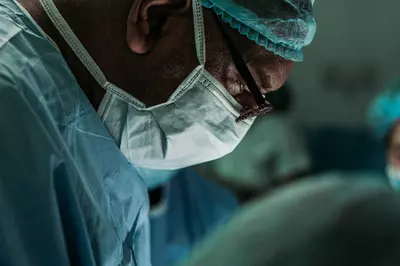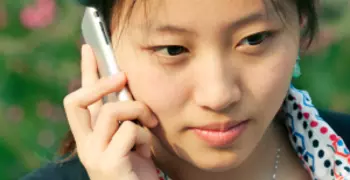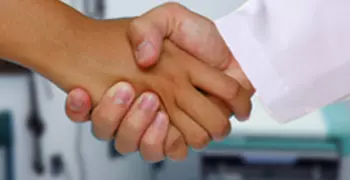
Psychiatrist Richard Friedman surprised himself one day during a routine appointment with a patient experiencing anxiety about a financial problem.
Bothered by something in his patient Mark's appearance, Dr. Friedman "did something out of pure intuition that I didn't fully understand at the moment. I called his internist while he was in my office and sent him for an appointment a few hours later."
Dr. Friedman was puzzled by his own gut reaction. He routinely encountered people suffering from anxiety and his patient had no previous history of medical illness. He was also worried about what his internist colleague would think—would he laugh?
 As it turned out Mark's internist did not have reason to laugh. Mark was not just suffering from anxiety, but health complications in his lung. Care began immediately and Mark's condition improved.
As it turned out Mark's internist did not have reason to laugh. Mark was not just suffering from anxiety, but health complications in his lung. Care began immediately and Mark's condition improved.
How many healthcare professionals have similar experiences? If they do, how many are willing to admit it? And how would you have felt if you had been Mark? Would you have wanted to make a separate trip to an internist just based on Dr. Friedman's intuition?
What does the research show?
Few research studies have been done on healthcare professionals' use of intuition or their patients' attitude toward such a use.
In general, most healthcare professionals are reluctant to discuss intuition for good reasons-their patients, the public, hospital boards, and others do not consider intuition a legitimate part of evaluation and decision making procedures. If healthcare professionals use intuition, they primarily keep it to themselves, or only discuss it with colleagues in safe settings.
Nursing is an exception to this trend. More research studies have been done on intuition's role in nursing than in any other healthcare profession. And the results of studies in the last 10 years are interesting.
-
- Intuition is an important tool in nursing practice and part of nurses' synergistic response to patients and events.

-
- Researchers in a 2001 study used focus groups and survey techniques to collect data from 262 registered nurses on their understanding of intuition and their perceptions of its use.
-
- The researchers acknowledged that the nature of intuition prevents agreement on its precise definition and that there is little research evidence to support its existence. However, this did not prevent nurses from saying that they use intuition [gut feeling...I just knew...I sensed] during their interactions with patients.
-
- The authors conclude that intuition in the nursing setting is not a mystical power, but part of the nurses' analysis and response.
- Nurses with greater expertise and experience are more likely to use intuition to make decisions or evaluate patients' conditions than nurses with less experience and expertise.
In a 2005 review of studies of intuition in nursing, researchers conclude that "Intuition occurs in response to knowledge and is a trigger for nursing action and reflection." (They define intuition by citing the researcher Gritty: "Intuition is the sudden perception of a pattern in a seemingly unrelated series of events...Beyond what is visible to the senses.")
 In an earlier landmark study, researcher Benner pointed out that while intuition cannot be exclusively attributed to expertise, "the movement from analytical thinking to intuitive decision-making appears to develop as a practitioner reaches the expert level."
In an earlier landmark study, researcher Benner pointed out that while intuition cannot be exclusively attributed to expertise, "the movement from analytical thinking to intuitive decision-making appears to develop as a practitioner reaches the expert level."
In other words, although intuition's use is not limited to the expert nurse, the use of intuition to make clinical nursing judgments increases with the amount of clinical experience and proficiency. It is likely that increasing expertise helps experienced nurse use their intuition more skillfully and effectively.
- One study recommends that intuition be included in the practice, management, education, and research of nursing.
After an extensive review of the evidence, a 1997 paper concludes that intuition is a response to knowledge and is a trigger for a nurse's action and/or reflection.
Although nurses are forced to be covert about intuition's role because of the present emphasis on research-based evidence, they do use intuition as part of their response.
Noting this evidence, the authors argue that the essential nature of intuition cannot be ignored in the practice, management, education, and research of nursing.
Do physicians use intuition?
 In comparison to the number of studies done on nursing and intuition since 1978, there is little research about its use among physicians.
In comparison to the number of studies done on nursing and intuition since 1978, there is little research about its use among physicians.
However, this may be changing. A study published in 2003 focused on the role of evidence-based medicine, the patient, and intuition in the practices of 15 family primary care physicians. The authors state, "There was overwhelming agreement that intuition plays a vital role in the practice of family medicine." The physicians' comments included:
- "I really think that intuition has to have its own proper place in the management of patients."
- "I go with both in my practice. I know what the evidence is, but I still consider my intuition."
- "I see it as practicing EBM [evidence-based medicine] with the art of medicine behind you."
The stories of physicians who are willing to talk about intuition, such as that of Dr. Friedman at the beginning of this section, demonstrate the variety of ways that intuition speaks in the clinical setting. Here are some examples.
 Watching her patient bleed to death on the operating table, heart specialist Dr. Mimi Guernari spent hours trying everything she knew to stem the flow. Then, "out of the blue I thought of something I'd never used before and haven't used since: gel foam." This intuitive answer made her blink and wonder if she was hallucinating as she watched the bleeding stop. It saved her patient's life.
Watching her patient bleed to death on the operating table, heart specialist Dr. Mimi Guernari spent hours trying everything she knew to stem the flow. Then, "out of the blue I thought of something I'd never used before and haven't used since: gel foam." This intuitive answer made her blink and wonder if she was hallucinating as she watched the bleeding stop. It saved her patient's life.- "I still don't consciously know why I asked him to tell me about his job in a little more detail," Dr. Iver A Juster begins his Intuition Magazine interview. As his patient, a Silicone Valley executive who was complaining of stomach problems, described his dysfunctional relationship with his boss, Dr. Juster noticed that the expression on his patient's face was the same as when he was describing his stomach pain. Dr. Juster persuaded his patient that emotions could cause physical symptoms and recommended a two prong approach-one to deal with his emotions and the other his physical symptoms. Patient and doctor were satisfied with the outcome.
What is the role of intuition in a hospital setting?
Many providers and groups of providers are beginning to incorporate intuition into ways they care for patients. Here is one example.
Abbott Northwestern Hospital in Minneapolis opened its Institute for Health and Healing in 2004 with a new model that incl udes care teams composed of a nurse clinician, a massage therapist, and an acupuncturist. These care teams are available for consultation based on requests from the hospital's healthcare professionals or the patients themselves.
udes care teams composed of a nurse clinician, a massage therapist, and an acupuncturist. These care teams are available for consultation based on requests from the hospital's healthcare professionals or the patients themselves.
Because of the positive research on the role of intuition in nursing, the teams received intuition training and today intuition is integrated into their daily activities. Team members meet every morning to set their intention to heal and help those they are scheduled to visit that day. This is their morning invocation.
As we begin this workday, we invite in spiritual support of the highest good to guide us.
May we be clear channels to do our work with ease and grace, keeping the patient's greatest and highest good as primary.
May we remember our connection to the earth, the heavens, our inner knowing to each other and to all sentient beings.
May we each value time for self-care to replenish our own energy reserves.
Whoever is referred is the right person. Whatever work comes, it is the right work. Whenever it happens
is the right time.
And so it is.
Members of the team are encouraged to use their intuition to assess: What is needed, beyond what is required, by our patients today? By the healthcare professionals we will interact with? By family members we encounter? By the staff that serves our patients? And, by patients not on the list who we feel intuitively called to visit?
This openness to intuition allows the teams to act collaboratively on an intuitive level, just like a sport team performing "in the zone," knowing what to do and when to do it.
The results are impressive. In 2004, when in-hospital care teams began their work, they received about 200 referrals a month from physicians and patients and in 2006, that number has soared to 1300 patient visits a month.
What are medical intuitives?
Dr. Norman Shealy coined the term 'medical intuitive' to describe someone who is able to intuitively 'see' and diagnosis patients without the use of logical information. In 1973, Dr. Shealy began to test various medical intuitives' abilities and later identified Caroline Myss as 93 percent accurate.
Working with Dr. Shealy and on her own, Caroline Myss popularized the concept of the medical intuitive and explored with the public the meaning and methods of healing itself.
Because this site focuses on your intuition (rather than seeking someone else's intuitive input), we do not cover medical intuitives in detail here. We will just suggest that if you wish to seek the input of a medical intuitive about a health challenge, choose someone who is also a licensed healthcare professional. It is also advisable to get a second opinion whenever you are facing health issues.
In summary
Although research in nursing and medicine reflects that healthcare professionals use intuition in clinical settings, there is reluctance among professionals to discuss its use. Many questions about intuition's clinical use remain, including the following. How does intuition operate in clinical settings? Is expertise required for intuition to flourish? What role is intuition playing in clinical judgment and decision-making? How can intuition research be refined?
Perhaps Phillipus Aureolus Paracelsus, a famous 16th century physician, summarized this most clearly when he said: "Medicine is not only a science; it is also an art."
© 2006 Charlson Meadows, used with permission.
Brenner, P. (1984). From Novice to Expert: Excellence and Power in Clinical Nursing Practic. Addison-Wesley. Menlo Park, California.
Friedman, R. M.D. (2006). Anxiety about Anxiety Saved A Patient's Life. New York Times, Science Section, April 11.
Guarneri, M. MD. (2006). The Heart Speaks. Simon & Schuster, New York, pg. 73.
Juster, I., MD. (1989). What Does Intuition have to Offer Modern Medicine. Intuition Magazine, Vol 1, No.2. intuitmag,aol.com
Laskow, L. M.D. (1992). Healing with Love. Harper. San Francisco, CA.
King, L., Appleton, J. (1997). Intuition: a critical review of the research and rhetoric. Journal of Advanced Nursing, July, Issue 26, 194-202.
McCutcheon, H., Pincombe, J. (2001). Intuition: an important tool in the practice of nursing. Journal of Advanced Nursing, 35 (3), 342-348.
Noddings, N. (1984). Caring. University of Berkeley Press. Berkeley, CA.
Polge, J., (1995). Critical thinking: the use of intuition in making clinical nursing judgments. Journal of New York State Nurses Association, 26 (2): 4-9.
Rovithis, M., Parissopoulos, S. (2005). Intuition in Nursing Practice. ICSUS NURSE WEB JOURNAL, 22, (April/June).
Tracy, S., Dantas, G., Upshur, R. (2003). Evidence-based medicine in primary care: qualitative study of family physicians. BMC Family Practice, 4:6, www.biomedcentral.com/1471-2296/4/6


